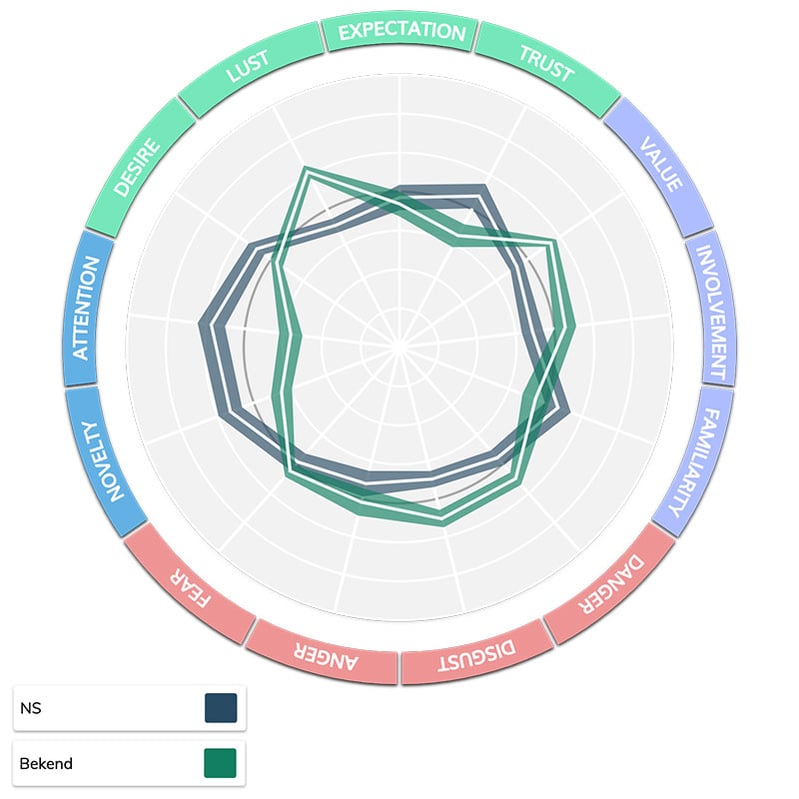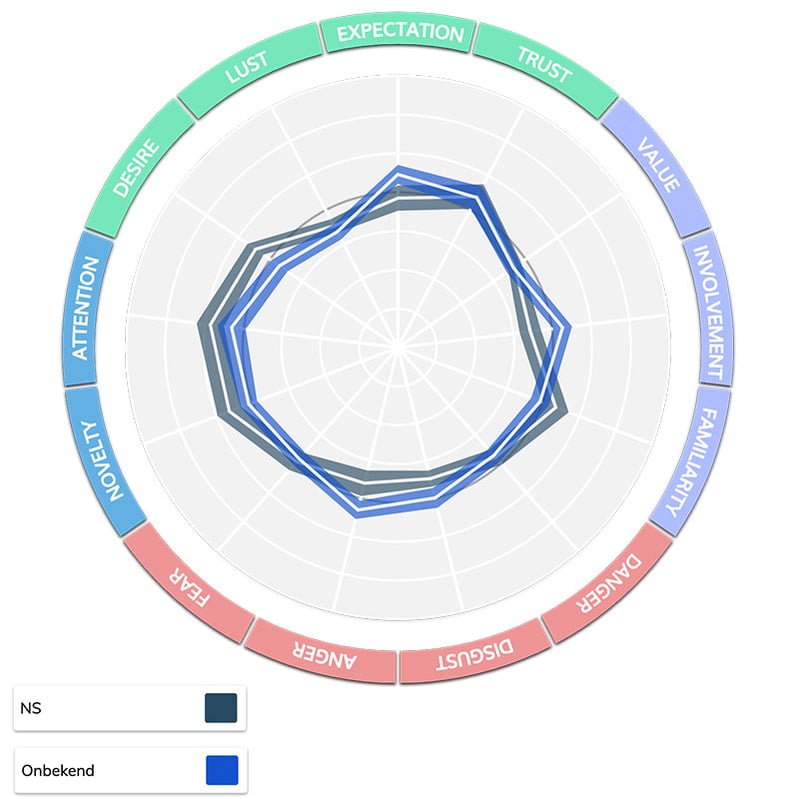"With the research done by Neurensics, we were able to look at the objective emotional response to Karins' voice. We came to the conclusion that the voice works even better than the voice of a beloved acquaintance. With this result in mind, we look forward to the introduction of the new rail times announcement voice at the stations". Tim van Leeuwen, Head of Travel Management, NS
Karin, the new voice for NS rail times announcements

If you have traveled by train in the Netherlands, you would have heard her: Karin, the new voice of rail times announcement for NS (Dutch railway). She informs travelers on train departure platforms and departure times, but also on train cancellations and possible alternatives.
In short, Karin's voice is one that NS travelers will hear most frequently. Therefore, it must be a voice that's easy on the ear. To investigate this, NS asked us to test Karin's voice in the MRI.
Research question NS
- How is Karin's voice objectively and automatically evaluated?
- Which (unconscious) emotions are activated by Karin's voice?
To answer these question, we observed test participants in the MRI while they listened to different voices with different messages. With fMRI, it is possible to observe which emotions are activated, directly from the brain.
The different messages
Three different messages were used in this study:
- Neutral message: as an example, the message informs people that the train to Hilversum and Amersfoort Central Station will also stop at Apeldoorn.
- Mildly negative message: as an example, the message announces that there are no trains between Utrecht Central Station and Schiphol Airport over the weekend due to maintenance works. The message ends with: Re-plan your trip in the NS app.
- Negative message: as an example, participants hear that the upcoming train to Schiphol Airport is cancelled and they're told when the next one will be available.
The different voices
In order to investigate how the new NS announcer voice is received, we compared it to other voices:
- We asked the test participants to request a mother, sister or friend record the same messages, importantly it has to be a voice beloved by the participants.
- In the MRI scanner, participants also heard the messages of other participants' beloved ones, in other words they heard strangers' voices.
Altogether, there were three categories of voices that participants heard: Karin the new NS rail times announcer's voice, a well-known, beloved's voice and strangers' voices.
How are the voices evaluated emotionally?
The MRI results showed:
- Out of the 3 categories of voices, Karin's voice scored the best on the balance of emotions: more positive than negative emotions were activated. Karin's voice was attractive and scored above average on Attention and Novelty. This shows that the new voice is attractive, which is important for a rail times announcements.
- The beloved's voice activated a high feeling of reward (Value) and also scored high on excitement (Lust). This makes sense, since participants heard a loved one speaking. Remarkably, the beloved's voice scored low on Trust. This may have to do with the fact that participants don't expect loved ones to know train schedules. Though participants may find a beloved's voice pleasant, it doesn't make a suitable voice for rail times announcements.
- The strangers' voices had an average score on emotions (approximately equal in positive and negative emotions) and also average score on feelings of reward (Value), Involvement and Familiarity.
These results have shown that Karin's voice is a good voice for rail times announcements. Karin's voice activates more positive than negative emotions, attracts attention and is attractive.
How did Karin's voice scored, compared to the other voices?
Karin's voice versus a beloved's voice
If we compare the results of Karin's voice to the voice of a beloved, the differences are clear:
- Karin's voice scored significantly higher on Attention, Novelty, Desire and Trust.
- In addition, Karin's voice scored significantly lower on Disgust and Danger.
- The beloved's voice scored better on the feeling of reward (Value) and Involvement than Karin's. The same applies to excitement (Lust).
Compared to a beloved's voice, Karin's voice is more impactful and appealing. It arouses more Trust and less negative emotions.


Karin's voice versus a stranger's voice
Compared to a stranger's voice, Karin's voice is again significantly more attractive (high Desire) and activated fewer negative emotions (low Anger and Disgust).
The stranger's voice did score slightly higher on Expectation and Involvement.
This results have once again shown that Karin's voice is attractive. In addition, Karin's voice is able to soften negative emotions. This is crucial for NS, given the possibility of delays, maintenance, track changes, etc.
Conclusion
- Karin's voice activated unique brain responses (see image below): negative emotions were less strongly activated when negative messages were read by Karin as compared to when the negative messages were read by a beloved's voice or a stranger's voice. Considering that NS needs to announce delays, maintenance and track changes, Karin's voice is a suitable one.
- In addition, Karin's voice is also more attractive than a beloved's voice or a stranger's voice. This shows that Karin's voice activated the best balance of emotions.
Karin's voice is well received emotionally. It is attractive and soothes negative emotions. These results indicate that Karin's voice is an excellent choice and will serve NS very well.

The red areas reflect negative emotions. The blue areas reflect positive emotions. Karin's voice causes less activity in the red areas.







